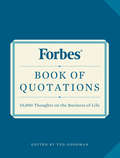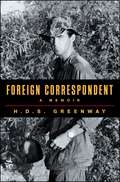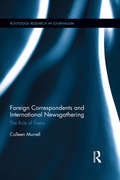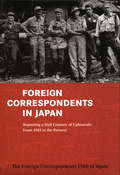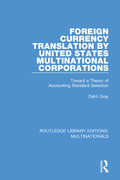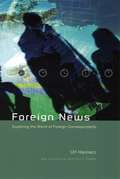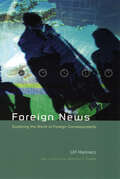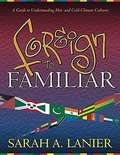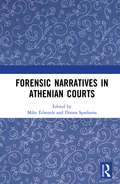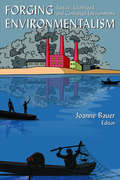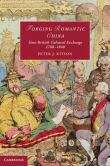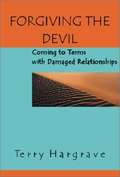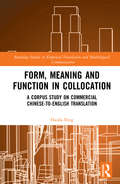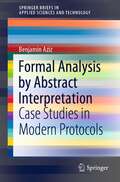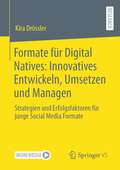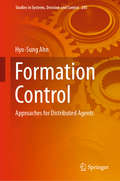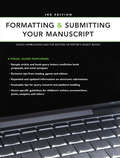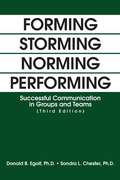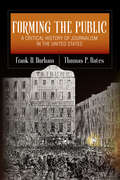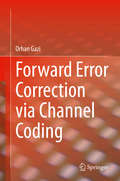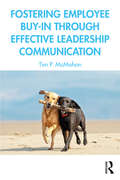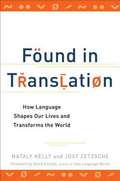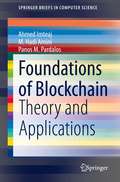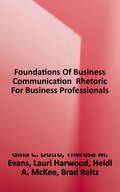- Table View
- List View
Forbes Book of Quotations: 10,000 Thoughts on the Business of Life
by Ted GoodmanRevised and updated, this bestselling collection of business wit and wisdom is the ultimate desk reference for the cube and corner office, by one of the world's most popular business publications. Forbes is one of the world's most trusted, recognizable, and growing brands in business news and information both in print and online. This comprehensive collection of business quotations gathers more than 10,000 apt, astute, and motivational remarks on scores of topics, organized alphabetically, from "Ability" to "Excellence" to "Salesmanship. " Originally published by Black Dog & Leventhal in 1997, this new edition is updated with hundreds of new quotations, from the likes of Steve Jobs Sheryl Sandberg, and Oprah Winfrey that pertain to modern business culture. Forbes Book of Quotations is the perfect gift or reference tool for students, budding entrepreneurs, and seasoned professionals alike, or anyone looking for a sharp-witted way to make a lasting impression. Forbes® documents and promotes innovation, leadership, politics, entertainment, technologies, culture, business, and style. Since 1917, Forbes magazine and Forbes. com have provided the world's business leaders with strategic insight and information. Ted Goodman is General Editor of the Avery Index to Architectural Periodicals. He lives in New York City.
Foreign Correspondent
by H.D.S. GreenwayDavid Greenway, a journalist's journalist in the tradition of Michael Herr, David Halberstam, and Dexter Filkins. In this vivid memoir, he tells us what it's like to report a war up close.Reporter David Greenway was at the White House the day Kennedy was assassinated. He was in the jungles of Vietnam in that war's most dangerous days, and left Saigon by helicopter from the American embassy as the city was falling. He was with Sean Flynn when Flynn decided to get an entire New Guinea village high on hash, and with him hours before he disappeared in Cambodia. He escorted John le Carre around South East Asia as he researched The Honourable Schoolboy. He was wounded in Vietnam and awarded a Bronze Star for rescuing a Marine. He was with Sidney Schanberg and Dith Pran in Phnom Penh before the city descended into the killing fields of the Khmer Rouge. Greenway covered Sadat in Jerusalem, civil war and bombing in Lebanon, ethnic cleansing and genocide the Balkans, the Gulf Wars (both), and reported from Afghanistan and Iraq as they collapsed into civil war. This is a great adventure story--the life of a war correspondent on the front lines for five decades, eye-witness to come of the most violent and heroic scenes in recent history.
Foreign Correspondents and International Newsgathering: The Role of Fixers (Routledge Research in Journalism)
by Colleen MurrellThis book reveals that 'fixers'—local experts on whom foreign correspondents rely—play a much more significant role in international television newsgathering than has been documented or understood. Murrell explores the frames though which international reporting has traditionally been analysed and then shows that fixers, who have largely been dismissed by scholars as 'logistical aides', are in fact central to the day-to-day decision-making that takes place on-the-road. Murrell looks at why and how fixers are selected and what their significance is to foreign correspondence. She asks if fixers help introduce a local perspective into the international news agenda, or if fixers are simply ‘People Like Us’ (PLU). Also included are in-depth case studies of correspondents in Iraq and Indonesia.
Foreign Correspondents in Japan
by Charles PomeroySince its founding in 1945, the Foreign Correspondents Club of Japan (FCCJ) has been a haven for working journalists. From its origins at "No. 1 Shimbun Alley" in the ruins of Tokyo immediately after World War II, the club quickly took on a life of its own. At times it became like a miniature United Nations, meeting the needs of hundreds of foreign journalists from around the world, who used it as a working press center as well as a social oasis.Club members, who include several Pulitzer Prize winners, have personally witnessed and reported on some of the most momentous events of the last half century-the end of World War II and the occupation of Japan; the revolution in China; the Korean War; Vietnam and the student riots of the 1960s; the height of the Cold War; Japan's economic miracle and the subsequent collapse of the "bubble" economy; the death of Emperor Hirohito; and much more.Foreign Correspondents in Japan gives an intimate and colorful look at these journalists who covered Asia for the rest of the world during five decades of sweeping change, and provides first-person accounts of history as it was being written.
Foreign Currency Translation by United States Multinational Corporations: Toward a Theory of Accounting Standard Selection (Routledge Library Editions: Multinationals)
by Dahli GrayMultinational corporate managers, financial analysts, and accountants disagree on what constitutes the appropriate process of translating and consolidating foreign financial statements into US financial statements. In this book, first published in 1993, the author examines financial accounting regarding foreign currency translation for and by multinational corporations by developing: (a) an historical background for the topic, (b) a comparative analysis of two foreign currency translation accounting standards, (c) a topical review of relevant prior research, and (d) a study of multinational corporate managers’ actions when they face a choice between two accounting standards. This title will be of interest to students of business studies.
Foreign News: Exploring the World of Foreign Correspondents
by Ulf HannerzForeign News gives us a fascinating, behind-the-scenes look into the practices of the global tribe we call foreign correspondents. Exploring how they work, Ulf Hannerz also compares the ways correspondents and anthropologists report from one part of the world to another. Hannerz draws on extensive interviews with correspondents in cities as diverse as Jerusalem, Tokyo, and Johannesburg. He shows not only how different story lines evolve in different correspondent beats, but also how the correspondents' home country and personal interests influence the stories they write. Reporting can go well beyond coverage of a specific event, using the news instead to reveal deeper insights into a country or a people to link them to long-term trends or structures of global significance. Ultimately, Hannerz argues that both anthropologists and foreign correspondents can learn from each other in their efforts to educate a public about events and peoples far beyond our homelands. The result of nearly a decade's worth of work, Foreign News is a provocative study that will appeal to both general readers and those concerned with globalization.
Foreign News: Exploring the World of Foreign Correspondents (Lewis Henry Morgan Lecture Ser.)
by Ulf HannerzForeign News gives us a fascinating, behind-the-scenes look into the practices of the global tribe we call foreign correspondents. Exploring how they work, Ulf Hannerz also compares the ways correspondents and anthropologists report from one part of the world to another. Hannerz draws on extensive interviews with correspondents in cities as diverse as Jerusalem, Tokyo, and Johannesburg. He shows not only how different story lines evolve in different correspondent beats, but also how the correspondents' home country and personal interests influence the stories they write. Reporting can go well beyond coverage of a specific event, using the news instead to reveal deeper insights into a country or a people to link them to long-term trends or structures of global significance. Ultimately, Hannerz argues that both anthropologists and foreign correspondents can learn from each other in their efforts to educate a public about events and peoples far beyond our homelands. The result of nearly a decade's worth of work, Foreign News is a provocative study that will appeal to both general readers and those concerned with globalization.
Foreign to Familiar: A Guide to Understanding Hot- and Cold-Climate Cultures
by Sarah A. LanierThe book divides the world into two halves: hot-climate cultures and cold-climate cultures and intends to be helpful to those who wish to cross the culture gap.
Forensic Narratives in Athenian Courts
by Mike Edwards Dimos SpatharasForensic Narratives in Athenian Courts breaks new ground by exploring different aspects of forensic storytelling in Athenian legal speeches and the ways in which forensic narratives reflect normative concerns and legal issues. The chapters, written by distinguished experts in Athenian oratory and society, explore the importance of narratives for the arguments of relatively underdiscussed orators such as Isaeus and Apollodorus. They employ new methods to investigate issues such as speeches’ deceptiveness or the appraisals which constitute the emotion scripts that speakers put together. This volume not only addresses a gap in the field of Athenian oratory, but also encourages comparative approaches to forensic narratives and fiction, and fresh investigations of the implications of forensic storytelling for other literary genres. Forensic Narratives in Athenian Courts will be an invaluable resource to students and researchers of Athenian oratory and their legal system, as well as those working on Greek society and literature more broadly.
Forging Environmentalism: Justice, Livelihood, and Contested Environments
by Joanne R BauerDrawing on an unusually rich empirical base, this timely and compelling book examines how environmental values are constructed and legitimized within the policy process. It trains the spotlight on four environmentally significant countries - China, Japan, India, and the United States - representing a wide diversity of cultural, social, economic, and political characteristics. Through a combination of case studies and comparative analysis, the contributors illuminate cultural assumptions, standards, and analytic techniques that shape environmental actions and policies around the world. "Forging Environmentalism" provides valuable direction regarding what can be done to secure public support for environmental policies. Incorporating expert legal, economic, philosophical, sociological, and political perspective points the way toward the possibilities for a convergence of environmental norms and values across diverse cultures.
Forging Romantic China
by Peter J. KitsonThe first major cultural study to focus exclusively on this decisive period in modern British-Chinese relations. Based on extensive archival investigations, Peter J. Kitson shows how British knowledge of China was constructed from the writings and translations of a diverse range of missionaries, diplomats, travellers, traders, and literary men and women during the Romantic period. The new perceptions of China that it gave rise to were mediated via a dynamic print culture to a diverse range of poets, novelists, essayists, dramatists and reviewers, including Jane Austen, Thomas Percy, William Jones, S. T. Coleridge, George Colman, Robert Southey, Charles Lamb, William and Dorothy Wordsworth and others, informing new British understandings and imaginings of China on the eve of the Opium War of 1839–42. Kitson aims to restore China to its true global presence in our understandings of the culture and literature of Britain in the late eighteenth and early nineteenth centuries.
Forgiving the Devil: Coming to Terms with Damaged Relationships
by Terry D. HargraveThis book is about forgiveness. The title of the book is meant to reflect the essential idea that "forgiveness" can be an active -- and powerful -- healing agent, even in the wake of the most heinous experience. The author's own moving story, which he shares here, coupled with case material and a thoughtful theoretical foundation, make this a uniquely accessible and penetrating resource for therapists and their clients.
Form, Meaning and Function in Collocation: A Corpus Study on Commercial Chinese-to-English Translation (Routledge Studies in Empirical Translation and Multilingual Communication)
by Haoda FengThe issue of differences between translational language and native-speaker language has become a topic of increasing interest in linguistics and Translation Studies (TS). One of the primary tasks in this research area is to employ a corpus approach and analyse collocations with authentic language data by comparing comparable corpora consisting of translated and native-speaker texts. Collocation in linguistics and TS refers to the relationship of co-occurrence between lexical items. The book shows that examining the use of collocations constitutes an integral part in assessing the naturalness of second language (L2) use, and therefore can be a valid measure to make a distinction between translational language and native-speaker language. Nevertheless, the role of collocation has not been given enough attention or discussed systematically in TS and, to date, there are hardly any translation theorists who have clarified the mechanism of collocation in TS, by which translators acquire receptive and productive knowledge of collocations in their L2. In addition, previous research in this area is largely confined to Indo-European languages, resulting in a lack of empirical evidence involving Asian languages. This book therefore attempts to bridge the gap in the literature and constitute an integral part in the research area.
Formal Analysis by Abstract Interpretation: Case Studies in Modern Protocols (SpringerBriefs in Applied Sciences and Technology)
by Benjamin AzizThe book provides a gentle introduction and definition of the denotational-based abstract interpretation method. The book demonstrates how the above method of formal analysis can be used, not only to address the security of systems, but other more general and interesting properties related to the testing, mutating and semantic ambiguity resolution of protocols. The book presents three case studies, all related to current complex protocols and standards used in industry, particularly in the context of IoT and Industry 4.0.
Formate für Digital Natives: Strategien und Erfolgsfaktoren für junge Social Media Formate
by Kira DrösslerKira Drössler zeigt, wie Management, Entwicklung und Content von innovativen Formaten für junge Zielgruppen gestaltet werden sollten, um Digital Natives nachhaltig auf Social Media-Plattformen zu erreichen. Mit stetigem Einbezug der Zielgruppencharakteristika entsteht ein Zyklus der Formatentwicklung, der seine Schwerpunkte auf Prozesse, eine flexible Organisation, Diversität bei der Entwicklung und den Einbezug junger Lebensrealitäten legt. Das Buch liefert damit auf Basis von Erkenntnissen aus Journalistik, Medienökonomie und Innovationsforschung sowie aus Interviews mit Akteuren des öffentlich-rechtlichen Onlineangebotes funk praxisrelevante Handlungsempfehlungen auf Format- und Senderebene für innovationsförderndes Management und die Konzeption junger Social Formate.
Formation Control: Approaches for Distributed Agents (Studies in Systems, Decision and Control #205)
by Hyo-Sung AhnThis monograph introduces recent developments in formation control of distributed-agent systems. Eschewing the traditional concern with the dynamic characteristics of individual agents, the book proposes a treatment that studies the formation control problem in terms of interactions among agents including factors such as sensing topology, communication and actuation topologies, and computations. Keeping pace with recent technological advancements in control, communications, sensing and computation that have begun to bring the applications of distributed-systems theory out of the industrial sphere and into that of day-to-day life, this monograph provides distributed control algorithms for a group of agents that may behave together. Unlike traditional control laws that usually require measurements with respect to a global coordinate frame and communications between a centralized operation center and agents, this book provides control laws that require only relative measurements and communications between agents without interaction with a centralized operator. Since the control algorithms presented in this book do not require any global sensing and any information exchanges with a centralized operation center, they can be realized in a fully distributed way, which significantly reduces the operation and implementation costs of a group of agents. Formation Control will give both students and researchers interested in pursuing this field a good grounding on which to base their work.
Formatting & Submitting Your Manuscript
by Chuck SambuchinoPrepare and Present Your Work Like a Pro! Formatting & Submitting Your Manuscript, 3rd edition, gives you all the information you need to craft a winning submission. Fully updated, this comprehensive resource now features more than 100 sample letters and manuscript pages, expanded instruction for electronic submissions, updated formatting and submitting guidelines, and new insider tips from top agents and editors. With strong and weak sample query letters, novel synopses, articles, nonfiction book proposals, manuscript pages, scripts, and more, you'll see exactly what works and what doesn't. Plus, each sample page features individual callouts to clearly identify and explain critical elements so that you don't miss a thing. With this all-encompassing guide, you'll discover everything you need to make your work look professional, polished, and publishable.
Forming Storming Norming Performing: Successful Communication In Groups And Teams
by Donald Egolf Sondra ChesterThe purpose of this book is to provide an introduction to Group and Team Communication. Emphasis is placed on giving readers guidelines for becoming successful communicators in groups and teams. Specific emphasis is placed on general introductory concepts, verbal and nonverbal communication, listening, conflict, problem solving, idea generation, decision making, e-collaboration, group presentations, leadership, leadership and power, and performance evaluations.
Forming the Public: A Critical History of Journalism in the United States (The History of Media and Communication)
by Thomas P. Oates Frank D. DurhamThroughout United States history, journalists and media workers have mobilized to promote and oppose various movements in public life. But a single meaning of the public remains elusive. Frank D. Durham and Thomas P. Oates provide an eye-opening analysis of the role played by journalism in the ongoing struggle to shape and transform ideas about the public. Using historical episodes and news reports, Durham and Oates offer examples of the influential words and images deployed by not only journalists but by media workers and activists. Their analysis moves from the patriot-inflamed emotions of the revolutionary period to the conventional and creative ways the American Indian Movement confronted the mainstream with their grievances. Weaving eyewitness history through US history, Forming the Public reveals what understanding the journalism landscape can teach us about the nature of journalism’s own interests in race, gender, and class while tracing the factors that shaped the contours of dominant American culture.
Forward Error Correction via Channel Coding
by Orhan GaziThis book provides a comprehensive explanation of forward error correction, which is a vital part of communication systems. The book is written in such a way to make the subject easy and understandable for the reader. The book starts with a review of linear algebra to provide a basis for the text. The author then goes on to cover linear block codes, syndrome error correction, cyclic codes, Galois fields, BCH codes, Reed Solomon codes, and convolutional codes. Examples are provided throughout the text.
Fostering Employee Buy-in Through Effective Leadership Communication
by Tim P. McMahonBased on a case study of leadership communication in a time of organizational change, this book gives new leaders insights into the tools and skills needed to become effective, motivating communicators in their leadership careers. Taking a holistic approach to communication and leadership, the book argues that employees buy in to change when they collectively feel engaged in meaningful work that will enrich the lives of customers, employees, and investors. Based on ethnographic research, it approaches the topic through an absorbing fiction-like retelling of an organization’s successful navigation of change against the backdrop of the 2007 mortgage crisis. In doing so, it establishes a framework for leaders to understand the principles behind how and why buy-in is generated in organizations. This unique approach allows readers to visualize leadership communication principles in practice. Fostering Employee Buy-in is ideal as a supplementary text in introductory leadership communication, management, and business courses or as a text for new leaders interested in inspiring organizational change.
Found in Translation: How Language Shapes Our Lives and Transforms the World
by Nataly Kelly Jost ZetzscheA lively look at the surprising role that translation plays all around us. Worth an estimated 31 billion dollars, translation is one of the biggest industries that goes largely unnoticed. Nataly Kelly and Jost Zetzsche are two veteran translators who have show how translation affects the daily life of millions of people. From hurricane warnings to holy books, from poetry to peace treaties, this is an illustration of how translation spreads culture and fuels the global economy.
Foundations in Written Communication
by Brian Gogan S. Atkins I. Atkinson K. Mitchell E. Spinner S. XaverThis text will be foundational to your work in written communication, upon which many of your other college classes and perhaps even your career will build. This text will provide you, your classmates, and your instructor with the metaphorical cornerstone of your foundation in written communication, as it will offer and explain various writing, reading, and research strategies that you can use to become a more successful writer. In each chapter of this book, you will encounter a significant number of writing strategies. These strategies are presented to you in a way that is both highly practical--in many cases, a series of step-by-step instructions and examples are provided for you to thoroughly explain each strategy-- and also theoretical--in all cases, the strategies emerge from rich theories of writing, including some innovative approaches to the teaching of writing. Among these strategies, you can expect to find a series of invention activities, which will help you to conceptualize your ideas about writing and generate material for your writing. Some of these strategies can be categorized as aleatory procedures because they embrace chance. Some of these strategies can be categorized as heuristic procedures because they encourage problem-solving. And, a final group of these procedures can be categorized as algorithms as they work with models and formulas. Together, these invention strategies will jumpstart your writing work.
Foundations of Blockchain: Theory and Applications (SpringerBriefs in Computer Science)
by Panos M. Pardalos M. Hadi Amini Ahmed ImteajThis book provides a comprehensive analysis of fundamental topics related to blockchain. Throughout, the authors explore different vital issues and specific areas of blockchain. For convenience, the authors present the elementary description, visualize the working procedure of blockchain paradigm, and highlight the areas it can be applied in real life. They explain the blockchain process from a diverse perspective i.e. distributed Internet of Things (IoT), interdependent networks, intelligent mining, etc. They also analyze the interconnection of a blockchain network and such novel research areas to show a pathway towards a new research direction. This book also holds the core challenges and open research issues of blockchain technology, considering existing applications. Chapters include consensus mechanisms of blockchain, blockchain applicability in centralized and decentralized internet of things, blockchain interoperability from the perspective of interdependent networks, and blockchain for resource-constrained devices.Specifies the importance of theoretical methods in dealing with problems in the context of blockchain for interdependent decision making;Provides a comprehensive investigation of blockchain algorithms and the recently developed methods based on this algorithm;Provides basics and mathematical foundations needed to learn and deploy blockchain.
Foundations of Business Communication: Rhetoric for Business Professionals
by Lauri Harwood Heidi A. McKee Gina C. Dutro Theresa M. Evans Brad ReitzFoundations of Business Communication: Rhetoric for Business Professionals, was written by the faculty of BUS 102 to provide a resource to help you in BUS 102, in your other FSB courses, and in your professional career. - Chapter 2: Business Communication Today explains the importance of effective communication in today's globally networked workplace and defines the characteristics of effective business communication. - Chapter 3: Rhetoric in Business Communication introduces the key concepts and strategies of rhetoric, the art and practice of effective communication. You will learn how to analyze the rhetorical situation of business communication so that you can craft effective messages appropriate for your purpose, audience, and context. - Chapter 4: Delivering Oral Communications examines the rhetoric of oral delivery, strategies for organizing oral communications, and design tips for presentation visuals. The primary focus is on extemporaneous presentations, but oral communications in other business contexts are also considered. - Chapter 5: Developing Business Relationships explains how to introduce yourself within business communities and how to frame requests that establish goodwill with your audience(s). This chapter also has tips for writing business emails. - Chapter 6: Business Communication Processes provides guidelines for the composing process for a variety of oral and written communications. - Chapter 7: Planning for the Job Search offers an overview of the job search communication process, from locating position announcements and networking to interviewing and job acceptance communications. - Chapter 8: Writing Cover Letters has information and advice on how to write a cover letter that will stand out to prospective employers. The assignment scenario focuses on opportunities available to early career college students, and from this project many students have found excellent summer internships and jobs. - Chapter 9: Collaborating and Communicating as a Team builds from the work on collaboration begun in BUS 101 and delves into the specifics of how to research, write, and present as a team. - Chapter 10: Reporting Your Findings examines the structure of formal recommendation reports and provides foundational strategies for how to narrate and represent qualitative and quantitative data. - Chapter 11: Making Recommendations explains how to deliver credible recommendations in writing and orally that are clear, concise, and thorough. - Chapter 12: Looking Back, Moving Forward covers the importance of reflective analysis for transferring learning from your first-year experiences into FSB's upper division core and major courses and on into your professional careers.
